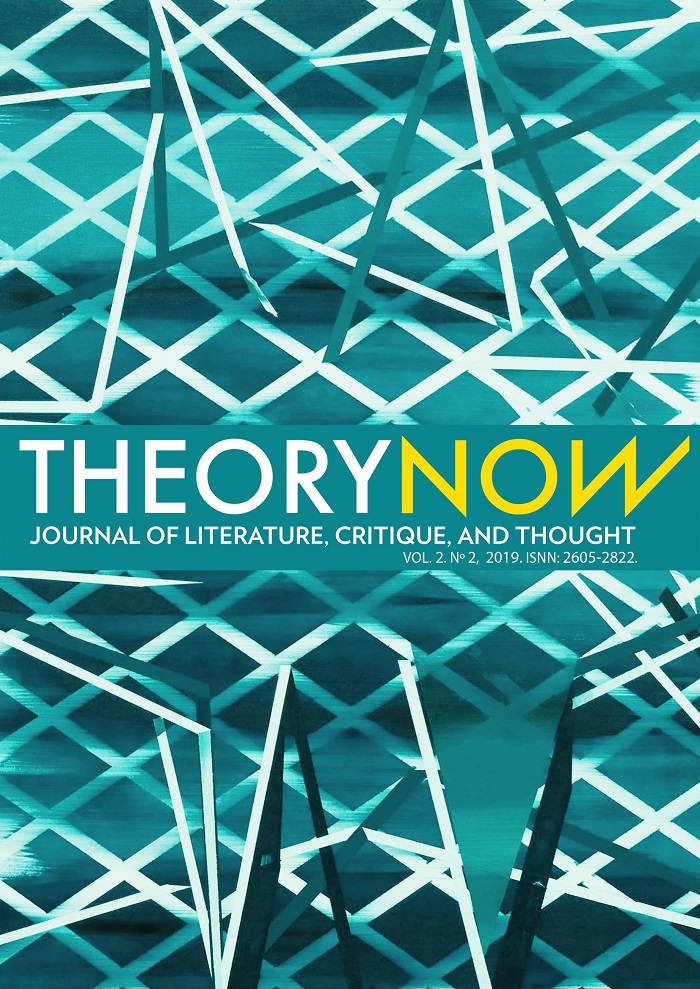El ‘Secreto Mortal’ de la profecía: lenguaje performativo y parabólico en The Fishermen, de Chigozie Obioma
DOI:
https://doi.org/10.30827/tnj.v2i2.9510Palabras clave:
Profecía, Acto de habla, Lenguaje performativo, Secreto, Lenguaje figurativo, Parábola.Resumen
En The Fishermen (2015), de Chigozie Obioma, contemplamos los trágicos acontecimientos provocados por una profecía de la que son testigos cuatro hermanos nigerianos. En este artículo mi objetivo principal es, siguiendo el análisis de J. Hillis Miller de los actos de habla en la literatura, y también ideas de Jacques Derrida y Derek Attidge, desarrollar un argumento sobre esta profecía como un uso performativo de las palabras que hace que algo suceda en el mundo a través de las personas que la escuchan y creen en ella. Es un acto de habla caracterizado por el secretismo, la oscuridad y la ambigüedad, dada la imposibilidad de verificar sus palabras como verdaderas o falsas y su indecidibilidad en relación con el uso literal y figurativo del lenguaje. Un acto de habla de este tipo necesita un destinatario que crea en él de un modo ingenuo y literal. Ikenna, el hermano mayor, resulta ser ese destinatario, ya que, al igual que sus hermanos, interpreta el lenguaje al pie de la letra, incapaz de reconocer su carácter parabólico y engañoso. Ello les lleva a actuar en la realidad dirigidos por las palabras, en todos los casos con fatales consecuencias. A través de su dimensión performativa, y haciendo un paralelismo entre esa tragedia familiar y la trágica evolución de la nación nigeriana debido a los efectos de la colonización y de los acontecimientos políticos de los años 90, The Fishermen representa el poder de las palabras para determinar y transformar las creencias personales y colectivas y la realidad misma.Descargas
Citas
Attridge, Derek. The Singularity of Literature. London, Routledge, 2004a.
___. J.M. Coetzee and the Ethics of Reading: Literature in the Event. Chicago, The University of Chicago Press, 2004b.
Austin, Blair. “An Interview with Chigozie Obioma”. Fiction Writers Review, 24 Oct 2016, https://fictionwritersreview.com/interview/an-interview-with-chigozie-obioma-2/. Accessed 20 March 2019.
Austin, J.L. How To Do Things With Words. Oxford, The Clarendon Press, 1962.
Blanchot, Maurice. The Unavowable Community. Translated by Pierre Joris, Barrytown, N.Y., Station Hill Press, 1988.
Calinescu, Matei. “Secrecy in Fiction: Textual and Intertextual Secrets in Hawthorne and Updike”. Poetics Today, 1994, vol. 15, no. 3, pp. 443-465.
Christidis, A.F. “Prophetic Discourse”. A History of Ancient Greek: From the Beginnings to Late Antiquity, edited by A.F. Christidis, Cambridge, CUP, 2007, pp. 1367-1376.
Derrida, Jacques. Given Time: I. Counterfeit Money. Translated by Peggy Kamuf, Chicago, Chicago UP, 1992.
___. On the Name. Edited by Thomas Dutoit, translated by David Wood, John P. Leavy, Jr., and Ian McLeod, Stanford, Stanford UP, 1995.
Eliot, George. Adam Bede. London, J.M. Dent, 1960.
Fallowes, Graham. “Power and Performativity: ‘Doing Things With Words’ in Kafka’s Der Prozeß”. Oxford German Studies, 2015, vol. 44, no. 2, pp. 199-225.
Go, Nathan. “Of Animal Metaphors and the British Legacy: An Interview with Chigozie Obioma”. Michigan Quaterly Review, 9 Apr 2015, https://sites.lsa.umich.edu/mqr/2015/04/of-animal-metaphors-and-the-british-legacy-an-interview-with-chigozie-obioma/. Accessed 20 March 2019.
Habila, Helon. “The Fishermen by Chigozie Obioma Review – Four Brothers and a Terrible Prophecy”. The Guardian, 13 Mar 2015, https://www.theguardian.com/books/2015/mar/13/the-fishermen-chigozie-obioma-review. Accessed 30 March 2019.
Kermode, Frank. The Genesis of Secrecy: On the Interpretation of Narrative. Harvard, Harvard UP, 1979.
Martín Salván, Paula. “Ideas of Community in Thomas Pynchon’s The Crying of Lot 49”. Pynchon Notes, 2009, vol. 56-57, pp. 74-86.
Miller, J. Hillis. Tropes, Parables, Performatives: Essays on Twentieth-Century Literature. New York, Harvester Wheatsheaf, 1990.
___. Ariadne’s Thread: Story Lines. Yale, Yale UP, 1992.
___. On Literature. London, Routledge, 2002a.
___. Speech Acts in Literature. Standford, Stanford UP, 2002b.
___. Literature as Conduct: Speech Acts in Henry James. New York, Fordham UP, 2005.
___. Reading for Our Time: Adam Bede and Middle March Revisited. Edinburgh, Edinburgh UP, 2012.
Nishimura, Satoshi. “Language, Violence, And Irrevocability: Speech Acts in Tess of the D'Urbervilles”. Studies in the Novel, vol. 37, no. 2, pp. 208-222.
Obioma, Chigozie. The Fishermen. London, Pushkin Press, 2015.
Rabinowitz, Nancy Sorkin. Greek Tragedy. Malden, Blackwell, 2008.
Rodríguez Salas, Gerardo. “Tasmania’s Cupboard: Indigenous and Convict Australia in Carmel Bird’s Writing”. Journal of Language, Literature and Culture, 2018, vol. 65, no. 3, pp. 169-186.
Salisbury, Joyce E. Encyclopedia of Women in the Ancient World. Santa Barbara, ABC-CLIO, 2001.
Shepherd, Gordon and Gary Shepherd. “Mormonism and the Family International: Toward a Theory of Prophecy in the Development of New Religious Movements”. Prophecy in the New Millenium: When Prophecies Persist, edited by Sarah Harvey and Suzanne Newcombe, London, Routledge, 2013, pp. 165-184.
Sides, Bradley. “Fate’s Brutality: The Millions Interviews Chigozie Obioma”, The Millions, 7 Jan. 2019, https://themillions.com/2019/01/fates-brutality-the-millions-interviews-chigozie-obioma.html. Accessed 16 April 2019.
Wallace, Jennifer. The Cambridge Introduction to Tragedy. Cambridge, CUP, 2007.
Descargas
Publicado
Cómo citar
Número
Sección
Licencia
Theory Now Journal of Literature, Critique, and Thought es una publicación de acceso abierto e inmediato totalmente gratuita, tanto para lectorxs como para autorxs. Lxs autorxs no pagan ningún tipo de tasa por el proceso editorial de sus artículos. Permitimos la lectura, descarga, copia, distribución, impresión, búsqueda, enlace o reutilización con fines no comerciales de todos los trabajos publicados, siempre que se citen la autoría, la revista y el órgano editor. Todo material intelectual publicado en esta revista se encuentra protegido con una licencia de Creative Commons Reconocimiento-NoComercial .
Recomendamos encarecidamente la difusión de los artículos en redes sociales (Facebook, Twitter, LinkedIn, etc.) y científicas (ResearchGate, Academia.edu, etc.), repositorios institucionales universitarios y otros repositorios públicos, blogs y webs personales o institucionales, Google Scholar, ORCID, ResearchID, ScopusID, etc. En cualquier caso, la propiedad intelectual de los artículos y los posibles derechos económicos derivados de ellos son exclusivamente de sus autores.













